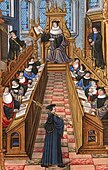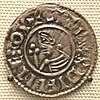User:Grimhelm/Did you know
Appearance
- ...that the Siege of Constantinople by the Rus in 860 is known primarily from the writings of Patriarch Photius, who referred to the invaders as "a swarm of wasps" and compared their attack to "a thunderbolt from heaven"? --31 October, 2006
- ...that Bolli Bollasson, a character in the Medieval Icelandic Laxdœla saga, is credited as the first West Norse member of the Varangian Guard (pictured)? --January 29, 2007.
- ...that the history of science and technology in China was made known in the West largely through the work of the Jesuits and later through Joseph Needham? --February 9, 2007
- ...that Sausenburg Castle (pictured) in Germany was destroyed in 1678 by the army of French Marshall Creque during the Franco-Dutch War? --14 February 2007


- ...that English cannon batteries (pictured) required artillery crews of twelve per gun? --16 March 2007
- ...that William the Conqueror's transport of over 2000 horses across the English Channel during the Norman invasion of England is depicted in the Bayeux Tapestry (pictured)? --16 March 2007
- ...that during the 1690 Battle of Québec , a group of French paddled a canoe up to the English flagship and under a hail of musket shots managed to return its ensign to the city unscathed? --17 March 2007
- ...that Fort Senneville, built in 1671 near Montréal, included the most fortified windmill in New France, along with a machicolation and other castle-like features? --18 March 2007


- ...that medieval cannon (pictured) were first used by the English during the Hundred Years War at the Battle of Crécy? --24 March 2007
- ...that French artillery officers were the most efficient at cannon operation (pictured) during the 18th century, firing 150 shots per cannon daily during siege, instead of the usual 100? --18 April 2007
- ...that the earliest European term for "cannon" was the Medieval Latin word "bombardum", and that "cannon" itself came from the Latin word canna, meaning a tube? --28 May 2007
- ...that the earliest cannon projectiles were round shot and grapeshot? --28 May 2007
- ...that miniature scale for naval wargames is worked out almost exclusively in ratios, rather than the millimetre-based scale preferred by land-based miniature wargaming? --19 June 2007
- ...that the Condemnations of 1277 at the University of Paris (pictured) are cited by historians as the birth of science, as they forced scholars to question Aristotle and think about the physical world in new ways? --21 April 2008
- ... that the Hiberno-Norse King of Dublin, Sigtrygg Silkbeard, established Ireland's first mint (coin of Sigtrygg pictured) in the 990s at Dublin? --17 March 2009
- ... that Brodir and Ospak of Man were two 11th-century Danish brothers who fought on opposite sides at the Battle of Clontarf in 1014? --17 March 2009

- ... that in 1029, the ransom of the Hiberno-Norse prince Amlaíb mac Sitriuc included over 1,200 cows, 60 ounces of gold and of silver, "the sword of Carlus", and a large number of Irish hostages? --23 March 2009
- ... that after the Battle of Glenmama in the Wicklow Mountains in 999, Brian Boru's Munster forces occupied the city of Dublin for over a week? --24 March, 2009
- ... that the founder of the Cistercian Abbeyknockmoy in 1190, Cathal Crobhdearg Ua Conchobair, King of Connacht, was buried there in 1224? --12 April, 2009
- ... that Cistercian architecture, "counted among the most beautiful relics of the Middle Ages", was made possible by the Cistercian Order's innovativeness and skill as metallurgists? --12 April, 2009
- ... that in the medieval Irish satire The Tale of Mac Da Thó's Pig, the Connaught champion Cet mac Mágach is unbeaten in a bragging contest, until being slapped in the face with the head of his dead brother? --19 June, 2010


